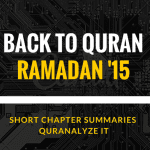What this project is: This Ramadan, rekindle your spirituality and relationship with God by reading the Quran in a language you understand! To facilitate those who find reading the Quran for the first time daunting, we, at Quranalyze It, will be posting short chapter summaries to get you acquainted with the basic theme and content of a particular chapter. It is important to note, however, that these summaries are no substitute to reading the Quran, and should be used as a bridge towards the Quran, or as an additional tool.
If you like the idea behind this project, and would like to read the summaries of the subsequent chapters in the coming days, then subscribe to our blog to receive an email whenever we publish a new summary. Please read, and share it far and wide!
The theme of Chapter 4 seems to be about socio-economics, with an emphasis on following the messenger to attain these goals. Establishing justice is also emphasized, and is another prevalent theme of the chapter.
To me, the first four passages (1-42) of chapter 4 seem to resemble Ch 2 as they contains numerous ordinances, this time geared towards socio-economics: rights of men, women, and orphans. The last ten passages (43-176) seem to resemble Ch 3 as they urge the reader to fight for the oppressed, constantly reminding the reader to not take protectors outside his ranks and to be wary of the threats proposed by the enemies.
Here are some interesting thoughts on Chapter 4 from the book Introduction to Quran: An Existential Reading by Farouk Peru:
1. Ch 4 is one of two chapters in Quran starting with ‘oh people’ (ya ayyuha an-naas). The other is Ch 22, Al-hajj. This may be due to the fact both chapters are giving humankind specific paths to achieve the utopian ideal.
2. Ch 4 has its first section (4/1-18) address mankind to establish a just and organic society in terms of dependency. This happens when we take care of those who are alone with no one to care for them (al-yateem).
3. Ch 4 then has 3 sections with calls to believers (4/19-28; 4/29-42 ; 4/43-57). These three sections give consequent answers to the first call to mankind. It gives specific instructions on formation of that society. There are 3 aspects with are social relations, trade and preparation of the self.
4. Ch 4 has a unique call which is to those given the book (alladhina ootu al-kitab in 4/47-58). These are the people given the system of God (idealised in 4/1) after following the steps mentioned above. This is not found anywhere else in Quran and could show us the overarching theme of Ch 4.
5. Ch 4 includes the story of *musa* and the people of his system (ahl al-kitab). The lesson of the sabt is that there are phases of growth and rest in the course of building society (4/153-154).
6. Ch 4 also mentions the oppression of those who prefer comfort, alladhina haadoo (4/160-161). These people were lenient about establishing the system of God and were content about riba, the fruits of oppressive economics. For that, Allah sanctioned them from the good things.
7. Ch 4 has a final call to mankind (4/174) mentions the word ‘burhaan’ which is translated as proof. This call is placed here because the proof of Islam’s system is self-evident – when Islam is established, it is proof for everyone to see. Not coincidentally, the purpose of hajj in Ch 22 (which starts with the call to mankind like this chapter, Ch 4), is for people to see the system for themselves (22/27-28).
Passage Breakdowns:
Passage 1 (1-18)
- First call to mankind: Attain Taqwa of your Rab (be conscious of your Sustainer)
- Don’t consume the resources of orphans unlawfully and be just with them. Release their property to them when they become mentally mature to handle it.
- The infamous polygamy verse.
- Provide marital gifts to your wives when you marry.
- Inheritance laws: Both men and women get a share (These are detailed in the passage). Also encourages providing for the needy out of the inheritance.
- Those who corrupt the ordinances laid above, four witnesses must be gathered and legal action taken.
- Forgiveness only for those who commit evil in ignorance, and don’t repeat their mistakes.
Passage 2 (19-28)
- First call to believers: Forced marriage forbidden and cordial relationships between man and woman encouraged.
- In case of marrying for the second time, you must not take back the marital gift you had given to your former wife.
- Ordinances on whom you can’t marry.
- Passage ends by reminding the reader that God seeks ease for you.
Passage 3 (29-42)
- Second call to believers: Do not consume one another’s wealth wrongfully. This will destroy your “nafs” (soul).
- Avoid the grave sins, and your minor sins will be forgiven.
- In financial matters, don’t be jealous of others. Both men and women have full rights over what they earn, the inheritance left behind by their parents, and the marital gifts received by the women.
- Obey God and don’t set up authorities with Him. Be good to your parents, and be charitable with the needy.
- Don’t be stingy, and don’t spend to “show-off”.
Passage 4 (43-46)
- Third call to believers: Don’t approach Salat unless you know what you’re saying (Understand what you read or what is recited to you). Further ordinances on purity pre-Salat.
- Seek to embrace the book holistically.
Passage 5 (47-58)
- First and only call to those who have been “given” the book: Believe in what was revealed that confirms what you already possess and avoid setting authorities with God.
- Don’t claim purity for yourself. In other words, don’t be pompous. Also, never invent ordinances in the name of God.
- Embrace the book holistically and don’t follow false authorities.
- Establish Justice.
Passage 6 (59-70)
- Fourth call to believers: Obey God, the messenger, and those entrusted with authority. If you differ somewhere, refer to the book.
- Again, avoid following false authorities.
- Be dedicated to the cause you’re fighting for.
Passage 7 (71-93)
- Fifth Call to believers: Remain attendant against threats.
- Fight for those who are oppressed in the land.
- The source of everything good is God, while evil comes because of your decisions.
- Ponder over the Quran, if you find therein inconsistencies, it is not from God.
- Verify rumors.
- Whoever rallies to a good cause will have a share in it, and whoever rallies to a bad cause will have a share in it.
- When greeted with a greeting, respond by an equal or better greeting.
- Beware of hypocrites.
- Ordinances on the recompense of killing a “believer.”
Passage 8 (94-134)
- Sixth call to believers: Avoid Takfir (excommunication)
- Those who fight for a noble cause are superior to those who don’t.
- If you are oppressed, migrate if you can.
- When travelling, you may shorten your salat.
- Avoid secret meetings, unless for a noble cause.
- Shaitan will mislead and entice you, and will order you to change the creation of God. But what shaitan promises to you is but delusion.
- Best Deen is to surrender yourself to God, excel in goodness, and follow the example of Ibrahim.
- Ordinances on wives and orphans repeated.
Passage 9 (135)
- Seventh call to believers: Stand up firmly for justice, with no discrimination.
Passage 10 (136-143)
- Eighth Call to believers: Believe in God, the messenger, and the book.
- Don’t seek protectors outside your ranks.
- If someone mocks the revelations of God, simply walk away.
Passage 11 (144-169)
- Ninth Call to believers: Don’t seek protectors outside your ranks.
- Hypocrites deemed the worst.
- Impolite speech not allowed, unless by someone who was wronged.
- Don’t cause distinction between messengers.
- People will ask you to display “miracles.”
- Jesus was not crucified.
- None can be from the Ahl Kitab unless they believe in Alkitab.
Passage 12 (170)
- Second call to mankind: Truth has come to you from your Lord. If you believe it, it is only better for you.
Passage 13 (171-173)
- First call to people who possess the book: Do not commit excess in your deen, and don’t speak falsehood about God. Eesa served God and was a messenger. Don’t set up authorities with Him. God is one, not one of “three.”
Passage 14 (174-176)
- Third, and last call to mankind: There has come to you Burhan (Convincing proof) from your Lord, as a beacon of light.
- If you believe in God, He will guide you towards a straight path.
- Ends with the summation of inheritance laws.











